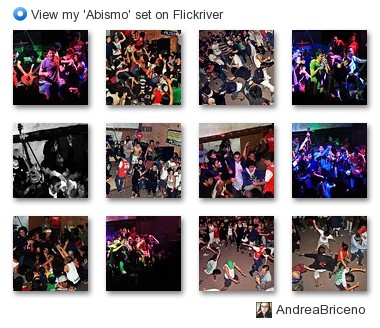And I swear I was being a good girl until someone, who happens to share names with a delicious tequila (Don Julio), decided to share a link with me, which made me realize that working at 10:37pm, on a Wednesday evening, is absolutely over-rated; thus, I shall stop wasting my energy with something I can do tomorrow morning, right!? In case I am not right, that's too bad because I already lost interest in editing what I was doing in the first place.
Given that I am only two days away from my first HC experience ever (if I don't remember any other ones, then this is indeed my first one...), I decided to succumb into the world of HC in the hopes that I wouldn't find out that I am allergic to anything other than naughty naughty Black Metal (which seems to be my latest cuppa tea BTW). For the sake of mankind, I am still very tolerant and appreciative of other genre. Not only that; it turns out that I am digging this latest recommendation quite a bit, to the point that I have now been caught in between the sticky web of HC suggestions on Youtube - yes, I have listened to two Madball songs, one Sick of it all, and some other stuff listed there.

In two days from now (well, more like 2 days and 12 hours, because shows here are a freakin' matinee), I will be joining dozens of HC fans (mostly minors) emanating from the various corners of this city, at the Amistad Para Todos Vol 1. show to watch some seriously awesome bands perform (I am dying to see Pitbull Live!) and to witness how they destroy each other in an absurd mosh pit, while I document the best of it with my camera. I have been told that the lighting situation is likely to improve at the Mama place, as the organizer does believe in throwing great shows, which include awesome lighting that will favor my photographic skills. Whether or not that happens, I am still very excited about the show.

Going back to the song that was sent to me: this band has quite the trajectory within the HC seen of Colombia. They have been together since '98, but like every other band, they have undergone a few lineup changes throughout their musical career. That's all I know! As I've said before, I will not pride myself on knowledge I do not have, so straight up, I had only heard of them... Fortunately nothing bad, but not enough to have a clear opinion about them, or the HC scene in this country, for that matter. The band is called Abismo. The song I heard has a rather interesting energy behind it; even though it is truly a great example of what HC, is it has something else that makes their beat quite addictive. I thought the video was very well done and I particularly enjoyed the specific focus on the players, and the depth of field used throughout the video.
FYI: Abismo will be part of the lineup playing at la Mama this Saturday, so I will make sure to take tons of photos, headbang if I have to and, lastly but certainly not least, bring you more details regarding their performance.
For the time being, I will leave you with the video that my friend, the tequila homonym, sent me, enjoy!
-Stay Metal-
Fraulein Andrea MMXI











.gif)


